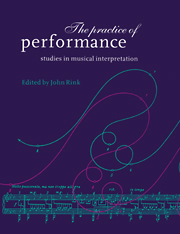Book contents
- Frontmatter
- Contents
- Preface
- PART ONE FUNDAMENTALS
- PART TWO STRUCTURE AND MEANING IN PERFORMANCE
- PART THREE PERFORMANCE AS PROCESS
- 9 Performance and analysis: interaction and interpretation
- 10 Analysis and the act of performance
- 11 The pianist as critic
- 12 Playing in time: rhythm, metre and tempo in Brahms's Fantasien Op. 116
- Index
11 - The pianist as critic
Published online by Cambridge University Press: 10 October 2009
- Frontmatter
- Contents
- Preface
- PART ONE FUNDAMENTALS
- PART TWO STRUCTURE AND MEANING IN PERFORMANCE
- PART THREE PERFORMANCE AS PROCESS
- 9 Performance and analysis: interaction and interpretation
- 10 Analysis and the act of performance
- 11 The pianist as critic
- 12 Playing in time: rhythm, metre and tempo in Brahms's Fantasien Op. 116
- Index
Summary
‘So far as it is alive, [it] is made again at every instant. It is made afresh as part of the process of being known afresh; what is permanent is what is always fresh, and it can be fresh only in performance – that is, in reading and seeing and hearing what is actually in it at this place and this time … Or put another way, the critic brings to consciousness the means of performance’ (Blackmur 1955: 199). When R. P. Blackmur wrote that, he was of course referring to literature. Using the quotation for my own purposes (Cone 1989: 108), I have tried to establish the critic of music as a kind of performer, whose ‘re-creation of a composition is, as it were, an ideal imaginary performance’ (: 102). But, as I pointed out, one can equally well view the performer as a kind of critic: ‘To put it aphoristically: the performance criticizes the composition’ (: 101).
The significance of my title should now be clear. By calling attention to the pianist as critic, I am not implying that he spends his spare time dashing off reviews for the daily press or producing more serious essays for the scholarly journals – although he may very well do so. What I mean is that, if he is a serious musician, his piano-playing itself is a critical endeavour – that each performance is an implied act of criticism. By singling out the pianist, I advance no special claims for his instrument or its music. I chose him for practical and personal reasons, for he is the only performer of whom I can speak from first-hand acquaintance.
- Type
- Chapter
- Information
- The Practice of PerformanceStudies in Musical Interpretation, pp. 241 - 253Publisher: Cambridge University PressPrint publication year: 1995
- 4
- Cited by

